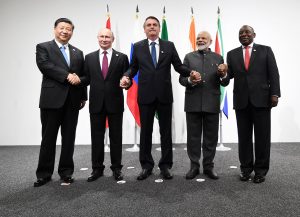Soon after Chinese President Xi Jinping’s emphasized the acceleration of the BRICS expansion process at the 14th BRICS Leaders’ Meeting in Beijing in late June, Iran and Argentina announced they had submitted their formal applications to join the group. Meanwhile, the foreign ministers of Kazakhstan, Saudi Arabia, Argentina, Egypt, Indonesia, Nigeria, Senegal, the United Arab Emirates, Thailand, and other guest countries attended the BRICS Foreign Ministers’ Meeting for the first time in May. All these positive actions are the clear indications that the expansion of BRICS is accelerating.
The main reasons for the expansion of BRICS can be attributed to the following three points: first, the intense East-West confrontation; second, the deepening of “BRICS Plus” cooperation; and third, the demands from “node” countries.
In the new context of the ongoing conflict between Russia and Ukraine and the intensifying Sino-U.S. competition, the confrontation between the East and the West has become increasingly prominent. Both sides, therefore, want to expand the network of friends and partners, thus consolidating their camps. As emerging economies and great powers in the region, the BRICS countries have a strong motivation to absorb other “node” countries with key strategic locations and booming economies to join the camp. The more intense the East-West confrontation, the stronger the impetus for the expansion of BRICS.
At the beginning of the establishment of BRICS, the meeting of foreign ministers was the main attraction, after which a declaration was issued. Although BRICS was later upgraded to a leaders’ summit, the practice of issuing declarations after the meeting continued. It was not until 2017, when China successfully hosted the BRICS Summit in Xiamen and proposed a “BRICS Plus” cooperation mechanism, that the connotation of BRICS as something that could reach beyond its five members was gradually enriched and clear.
Another prominent event was China’s donation of reserve funds to the BRICS New Development Bank (NDB). Subsequently, BRICS Plus cooperation has gradually expanded to areas such as economic and trade exchanges, political security, and people-to-people and cultural exchanges. Especially after the outbreak of the COVID-19 pandemic, the BRICS countries launched a vaccine research and development center on March 22, 2022, leading BRICS Plus cooperation onto an in-depth development track.
However, the continuous expansion of BRICS Plus cooperation is inseparable from the support of the regional states, especially “node” countries with considerable influence and important strategic positions in the region. Without the active participation of these node countries, BRICS Plus cooperation will lack a vast hinterland, making it difficult to sustain or become bigger and stronger. Therefore, many of the guest countries mentioned above are node countries with clear national strengths and obvious location advantages, such as Argentina and Indonesia. For these countries, being able to ride on the rapid development of BRICS with the help of BRICS Plus cooperation is simply a good deal with great profits. Therefore, these countries are also willing to join the BRICS “family.”
Compared to the expansion of the Shanghai Cooperation Organization (SCO), the expansion process of BRICS seems to be taking bigger steps at a faster pace. For example, the SCO was very cautious when it first started the expansion process, with only Iran, India, and Pakistan becoming observer states at the beginning. However, nine BRICS guest countries attended the foreign ministers’ meeting at once. Although a guest country is not yet an observer country, it is only one step away.
Nonetheless, the road to BRICS expansion will not be smooth. For example, it took 12 years for Iran, India, and Pakistan to go from becoming SCO observer states in 2005 to India and Pakistan finally becoming member states in 2017. Iran will not start the acceptance process until 2021. Based on the timing of India and Pakistan joining the SCO, Iran will not become a full member until 2023 at the earliest. This also reminds us that there are screening procedures and sequences in the evolution from observer states to full member states. Therefore, some of the guest countries mentioned above will definitely have priority to enter the observer country sequence, and then current BRICS members will select some countries from the observer countries to become member states. It will be a long journey that will take considerable time and effort.
In addition, BRICS has not yet issued any regulations or legal procedures for expansion, and these cumbersome rules must be passed through consensus. Only after all the legal and transactional systems and procedures have been prepared in the early stage can the expansion members be considered. It took six years for the SCO to accept the first observer state into the process of accepting new members. BRICS does not even have observer countries at present, so it will take longer.
It is worth noting that enlarging BRICS may not be as complicated and time-consuming as the expansion of the SCO, because the BRICS NDB has already accepted countries such as the United Arab Emirates, Uruguay, Bangladesh, and Egypt as members. Therefore, if the expansion process is carried out with reference to the acceptance procedures and existing members of the BRICS NDB, the expansion of BRICS will be faster. Additionally, as Iran and Argentina have already applied to join, BRICS will have to unveil the procedures of the expansion process as soon as possible.
In general, the BRICS expansion is supported by strong momentum and will be advanced gradually, but it will not happen overnight.

































